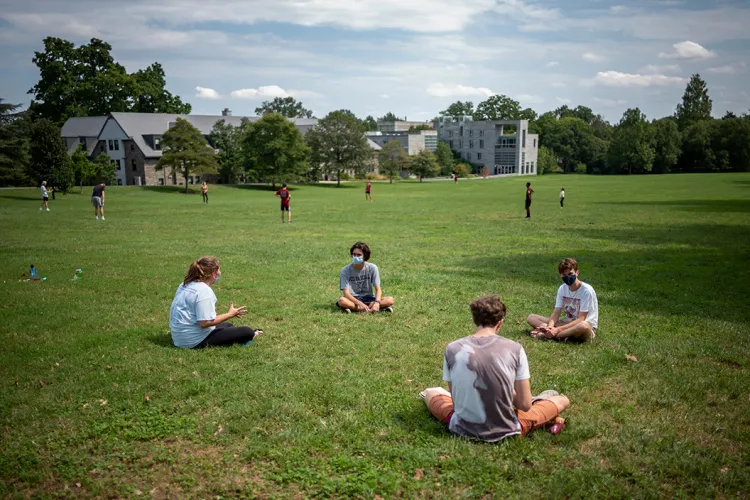Swarthmore Begins Classes, Welcomes Class of 2024

Swarthmore College welcomes 373 first-year students and 24 transfer students to its community this week, as the 2020–21 academic year officially begins. This is the start of the College’s 152nd year of instruction.
The first-year class was selected from 11,630 applicants, of whom 9% were offered admission.
“The Class of 2024 shows a strong interest in pursuing a collaborative and challenging liberal arts education,” says Jim Bock ’90, vice president and dean of admissions. “This promises to be a year like no other, but I am confident that, together, we are ready to support them, on campus or not, as they begin this exciting phase of their lives.”
Among the domestic students in the class, 8% identify as African American, 14% as Hispanic/Latinx, 22% as Asian American, and 10% as multiracial, including 11 who identify as Native American/Alaskan/Hawaiian or Pacific Islander/multiracial. In addition, 23% are the first generation in their family to attend college, and 23% receive Pell Grants. Fourteen percent of the first-year class are QuestBridge-affiliated students.
Members of the incoming class represent 43 states as well as the District of Columbia and Guam. California is the most popular location for high schools among the new class, followed by Pennsylvania, New York, New Jersey, Maryland, Texas, Massachusetts, North Carolina, Virginia, Arizona, and Delaware.
Twenty-four percent of students in the Class of 2024 are dual citizens, permanent residents, or non-U.S. citizens, representing Bangladesh, Belgium, Brazil, Bulgaria, Cambodia, Canada, China, Cyprus, Dominican Republic, Egypt, El Salvador, Ethiopia, France, Ghana, Greece, Guatemala, Guyana, Haiti, Hong Kong, India, Israel, Japan, Kenya, Lebanon, Mexico, Mongolia, Myanmar, Nepal, Nigeria, Pakistan, Palestine, Peru, Rwanda, Singapore, South Korea, Sweden, Taiwan, Thailand, Tunisia, Turkey, Ukraine, United Kingdom, Venezuela, Vietnam, and Zimbabwe.
The most popular anticipated majors among Swarthmore’s newest students are engineering, economics, computer science, political science, biology, philosophy, mathematics and statistics, English literature, psychology, biochemistry, and environmental studies.



